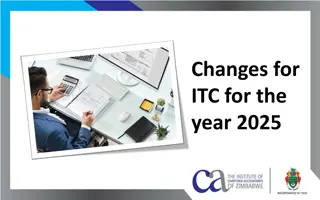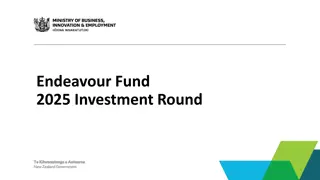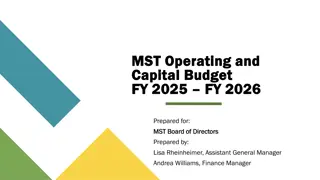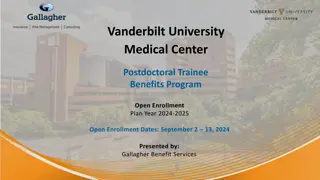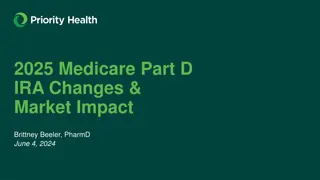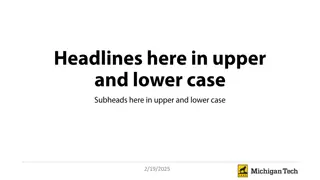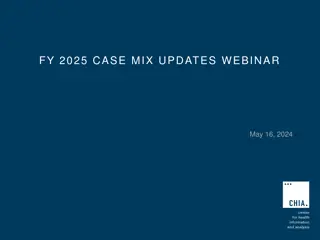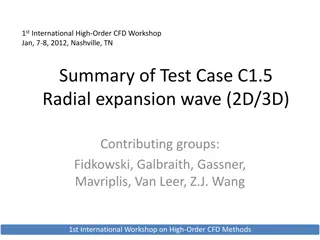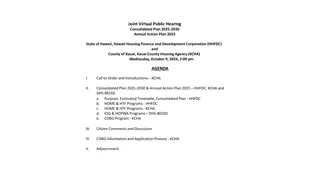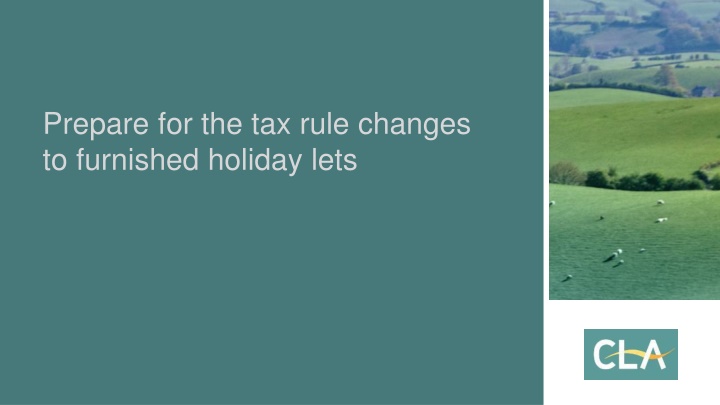
Tax Rule Changes for Furnished Holiday Lets - What You Need to Know
Discover the latest tax rule changes affecting furnished holiday lets, covering income tax implications like no separate accounts needed, amalgamated profits, limited finance cost relief, and more. Learn about the new rules determining trading status and implications for capital allowances and loss relief. Stay informed to navigate these changes effectively.
Download Presentation

Please find below an Image/Link to download the presentation.
The content on the website is provided AS IS for your information and personal use only. It may not be sold, licensed, or shared on other websites without obtaining consent from the author. If you encounter any issues during the download, it is possible that the publisher has removed the file from their server.
You are allowed to download the files provided on this website for personal or commercial use, subject to the condition that they are used lawfully. All files are the property of their respective owners.
The content on the website is provided AS IS for your information and personal use only. It may not be sold, licensed, or shared on other websites without obtaining consent from the author.
E N D
Presentation Transcript
Prepare for the tax rule changes to furnished holiday lets
CONTENTS What is changing? Income Tax Capital Gains Tax What remains the same? Inheritance Tax VAT Council tax/Business rates
INCOME TAX CURRENT RULES The Furnished Holiday Let (FHL) tax regime deemed a FHL business to be a trade for income tax if the property is: available for letting for more than 210 days a year actually let for more than 105 days a year This enabled a FHL Business to have more beneficial tax treatment than if it was a property business - an investment business for tax purposes
INCOME TAX NEW RULES No need to record days advertised and let Generally property income (section 4(1) ITTOIA 2005) Exception (HMRC Property Income Manual - PIM4300): Trading premises let of surplus part Caravan sites Hotels and guest houses Letting property and providing additional service (Salisbury House v Fry)
INCOME TAX NEW RULES FHL will only be trading if you - as the operator - can demonstrate you provide services over and above those usually provided by a landlord. Think of services that you can provide, so more akin to B&B which is a trade More disputes with HMRC
INCOME TAX IMPLICATIONS No need for separate FHL accounts FHL profits/(losses) are amalgamated with income from other let properties as single property business Finance cost restriction Restricted to basic rate of income tax (20%) Pension tax relief FHL profits not regarded as relevant earnings Do not qualify for tax relief when contributing to pensions
INCOME TAX IMPLICATIONS Capital allowances No capital allowances on furniture and furnishings, but will be eligible for replacement of domestic items Existing operators can continue claiming writing down allowances, but no new expenditure can be added after 6 April 2025 Loss Relief FHL loss carried forward from 24/25 or earlier can be only set off against other property income going forward
CAPITAL GAINS TAX IMPLICATIONS No roll-over relief, business asset disposal relief (BADR), gift holdover relief Watch out anti-forestalling provision Applies to contract exchanged between 6 March 2024 and 5 April 2025 Must complete the transaction before 5 April 2025 to benefit from the FHL rules BADR could still be available if the business is ceased before 6 April 2025 and the FHL property is sold within three years following cessation.
INHERITANCE TAX Not affected by abolition of the FHL regime Default position is that a FHL is not trading for IHT BUT o Based on level of services provided, see Grace Graham v HMRC o Shelter the FHL as part of a trading enterprise under Balfour
BUDGET ANNOUNCEMENTS Draft legislation not yet available Limit on APR and BPR 100% relief on first 1m 50% relief on value above this threshold Starts 6 April 2026, important to get advice
VAT Not affected by the abolition Provision of holiday accommodation is standard rated Need to charge 20% VAT if turnover of the business exceeds 90,000 Note: All business activities covered by same VAT registration Bear in mind VAT anti-avoidance rules to prevent fragmentation of supplies
VAT VAT 5% if charge users to connect them to a gas or electricity supply and metered VAT on water and sewerage is 0% if metered otherwise follows main supply (i.e. provision of holiday accommodation) See VAT Notice 709/3: hotels and holiday accommodation
COUNCIL TAX/BUSINESS RATES Rules unchanged Note tests to qualify for business rates: still a day count test England - must be let for 70 days Wales - must be let for 182 days
HOW TO BE A TRADING BUSINESS
ADDITIONAL SERVICES Landlord Trading Cleaning of communal area Regular cleaning of rooms (not just between changes of guests) Provision of hot water and heating Regular supply of linen Rent collection and arranging new tenancies Provision of meals 24/7 phone support Repairs and maintenance Welcome pack / departure protocol Other facilities, e.g. book library, bike rental etc.
TAX ADVANTAGES BEING A TRADE Entitlement to capital allowances on furniture, white goods, furnishings, vans and tools. CGT reliefs for traders, such as rollover, holdover and business asset disposal reliefs. Finance costs restriction does not apply
THANK YOU 16 Belgrave Square London SW1X 8PQ Tel 020 7235 0511 Fax 020 7235 4696 mail@cla.org.uk Email mail@cla.org.uk Website www.cla.org.uk


